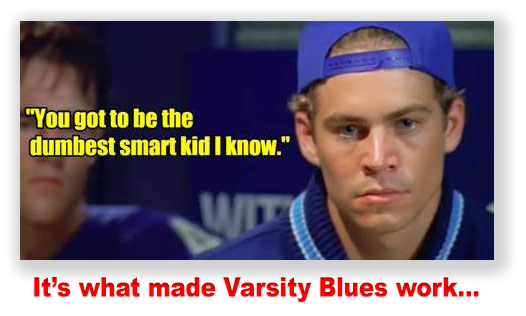We post news and comment on federal criminal justice issues, focused primarily on trial and post-conviction matters, legislative initiatives, and sentencing issues.

1ST CIRCUIT GIVES GOVERNMENT THE ‘VARSITY BLUES’
In a stunning reversal, the 1st Circuit last week overturned the fraud and conspiracy convictions on Wednesday of two parents found guilty of participating in the far-reaching bribery prosecution known as Operation Varsity Blues, which resulted in the convictions of dozens of wealthy parents who falsified their children’s applications and made payments to gain admission to prestigious universities from Harvard to USC.
 The biggest bribe I could have paid to get my kids into college would have been a Starbucks Frappuccino for the admissions counselor. But the mother of my kids is a very bright person (but for having married me many years ago), and the kids favored her, which is how I have two MBAs and a Ph.D. now for offspring.
The biggest bribe I could have paid to get my kids into college would have been a Starbucks Frappuccino for the admissions counselor. But the mother of my kids is a very bright person (but for having married me many years ago), and the kids favored her, which is how I have two MBAs and a Ph.D. now for offspring.
But some folks with a lot more star power and fatter wallets than I have children who – to put it charitably – struggled academically. I was shocked and appalled to think that these people would use all of the resources at their disposal to get their kids into some really good colleges. A parent doing everything in his or her power to help a son or daughter? Who has ever heard of such a thing?
The thinking was that once admitted, the kid would flourish (or at least graduate). What harm was there in taking a slot and agreeing to pay the freight for four years of great education?
That thinking was not the government’s, however. The government argued that those admission slots were property, and that the parents’ lies that Junior was a great water polo player or Sally had a killer backhand deprived the universities in question of a valuable resource.
The issue is crucial, because I cannot commit wire or mail fraud without depriving you of some actual property. When I helped my sister submit a photo of my parents for a newspaper piece on their 60th anniversary, I liberally applied Photoshop to clean up some of their wrinkles and gray hair. Only fair, because I caused more than my share of them. But it deceived the readers of the local rag into thinking that my folks looked pretty darn good for people in their mid-80s.
 I sent the picture to the paper by email. Was it 18 USC § 1343 wire fraud? No, because what I tricked people into giving up was just a sinking feeling that my mother and father looked better than their mother and father. And that ‘sinking feeling’ – regardless of how much schadenfreude I may have enjoyed from thinking of all of those readers with more wrinkled parents than mine – was not “property.”
I sent the picture to the paper by email. Was it 18 USC § 1343 wire fraud? No, because what I tricked people into giving up was just a sinking feeling that my mother and father looked better than their mother and father. And that ‘sinking feeling’ – regardless of how much schadenfreude I may have enjoyed from thinking of all of those readers with more wrinkled parents than mine – was not “property.”
Neither is a university admission offer. The 1st Circuit agreed with the defendants, holding that the trial court’s telling the jury that such offers were “property” as a matter of law swept too broadly. “We do not say the defendants’ conduct is at all desirable,” the 1st ruled. However, “the government’s highly general argument would criminalize a wide swath of conduct. Under the government’s broad understanding of property applied to admissions slots as a class, embellishments in a kindergarten application could constitute property fraud proscribed by federal law.”
The Circuit “rejected the Government’s theories of property rights not simply because they strayed from traditional concepts of property,” but also because the theory “invited the Court to approve a sweeping expansion of federal criminal jurisdiction in the absence of a clear statement by Congress.”
But the best part of this 156-page decision was the Court’s lengthy explanation as to why the defendants – most of whom had never met each other and had no connection other than they all hired William ‘Rick’ Singer as their college admission guru – were not engaged in a conspiracy.
 The court also found that the government had failed to prove that the two defendants had agreed to conspire with Rick’s other clients. “While the evidence suffices to show that [the mastermind] and his core group had a financial interest in whether children of parents other than the defendants obtained admission, no parent had any similar financial stake in how successful other children were in getting admitted through the services of the core group. [Precedent] does not permit us to conclude that the defendants’ mere awareness that [the mastermind] and the core group had other parents enrolled suffices to permit a rational juror to infer that the defendants shared the goal of advancing the success of that broader conspiracy.”
The court also found that the government had failed to prove that the two defendants had agreed to conspire with Rick’s other clients. “While the evidence suffices to show that [the mastermind] and his core group had a financial interest in whether children of parents other than the defendants obtained admission, no parent had any similar financial stake in how successful other children were in getting admitted through the services of the core group. [Precedent] does not permit us to conclude that the defendants’ mere awareness that [the mastermind] and the core group had other parents enrolled suffices to permit a rational juror to infer that the defendants shared the goal of advancing the success of that broader conspiracy.”
The government argued that this was the typical “spoke-and-wheel” conspiracy, where Rich was the hub and the defendants were all out on the rim. ‘Spoke-and-wheel” conspiracies are how the government likes to roll up big drug-trafficking organizations. It has always been troubling. If I am buying pot from ‘Toker’ Tom, what I care about is that he can supply me for a given amount of money. I don’t care if he charges other people double, or gives it away to others, or smokes whatever else he has himself. My success selling weed does not rely on the rest of Tom’s customers at all.
Rick’s deal was the same. Gamel Abdelaziz cared that Rick could get his daughter into the University of Southern California by turning her into a basketball phenom (despite the fact she didn’t make the cut for varsity in high school). Beyond that, a University official testified, she was “not an academically competitive applicant outside the athletic recruitment process,” a nice way of suggesting she might want to try the community college down the street.
 The point is that Gamel didn’t care a whit if Rick used or did not use the same legerdemain on his other clients’ kids, or even if Rick had other clients. It’s the Wendy’s Rule: each customer wants a perfect double bacon cheeseburger, but that customer doesn’t care whether the customer before or after got a good sandwich, or even whether he or she got a sandwich at all. Have the customers all conspired with each other and Wendy’s to possess with intent to distribute sandwiches?
The point is that Gamel didn’t care a whit if Rick used or did not use the same legerdemain on his other clients’ kids, or even if Rick had other clients. It’s the Wendy’s Rule: each customer wants a perfect double bacon cheeseburger, but that customer doesn’t care whether the customer before or after got a good sandwich, or even whether he or she got a sandwich at all. Have the customers all conspired with each other and Wendy’s to possess with intent to distribute sandwiches?
Here, the Court argued that the fact that Rick has a smorgasbord of shady ways to get your kid into college – paying off college coaches to claim your kid is Angel Reese, hiring a Ph.D. to take your kid’s ACT test, endowing a chair at the university – meant that the parents weren’t part of the same conspiracy. But that’s a false dichotomy: simply define the conspiracy as being one together undeserving kids into good colleges, and the different approaches just becomes means to get the job done.
The novelty of the charges and the celebrity status of many of the defendants made Varsity Blues a high-profile case, with moguls and movie stars alike pleading guilty and doing short bids in federal prison. “Almost everybody pleaded guilty, so the government’s legal theories weren’t really tested until this case was decided,” Joshua Sharp, one of the defense attorneys, told the New York Times.
But the Court’s analysis of conspiracies may be a legacy of ‘Varsity Blues’ that benefits a lot of people who may have sold weed to college kids without ever being a college kid themselves.
United States v. Abdelaziz, Case Nos 22-1129 and -1138, 2023 U.S. App. LEXIS 11507 (1st Cir., May 10, 2023)
New York Times, Appeals Court Overturns Fraud and Conspiracy Convictions in Varsity Blues Scandal (May 10, 2023)
– Thomas L. Root

